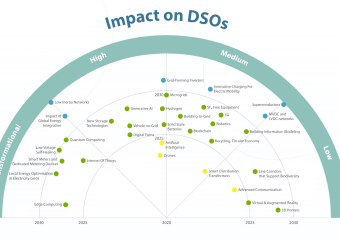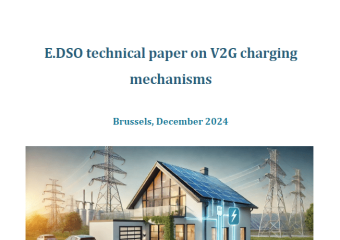Joint statement on battery-based storage
The European associations representing distribution system operators (DSOs), CEDEC, EDSO for Smart Grids and GEODE and the association of automotive and industrial battery manufacturers, EUROBAT call on the EU institutions to deliver a clear regulatory framework incorporating storage as a key instrument towards achieving the Energy Union. Battery energy storage is an important grid management solution that can help boost the robustness of Europe’s electricity grids. To make use of this opportunity, network operators should be allowed to own and operate batteries for the purposes of grid balancing and operation, as highlighted here by the European Parliament.
Electricity storage could be used by distribution system operators (DSOs) as an additional grid management tool that can serve multiple technical purposes. It can help to keep local electricity networks balanced and lower distribution losses while preventing congestions by storing energy when renewable generation is abundant but demand is low. It may also prove a more cost-effective option for reinforcing the network in a way that avoids or defers classical grid investments.
The rapid increase of less predictable, more dispersed and decentralised renewables, electric vehicles and heat pumps will affect distribution networks. DSOs’ access to local flexibility is already becoming a necessity for meeting these challenges, thereby enabling them to maintain the current levels of quality and service to Europe’s citizens.
Despite this growing need for flexibility, the deployment of battery-based electricity storage is currently being held back by the lack of a clear and future-proof regulatory framework. A clear definition for electricity storage in the EU legislation is currently missing. As a result, the use of battery-based energy storage is restricted for grid operators as in some member states DSOs are not allowed to own and operate storage. To realise these benefits, we call on policymakers to define a clear regulatory framework that:
- Provides a clear definition for electricity storage in the upcoming winter package. In the interim, national regulatory authorities should take stock of existing European initiatives to develop their own set of rules.
- Allows the DSOs, as neutral market actors who facilitate the development and the operation of flexibility services, to procure system flexibility services from storage facilities in the market. However, the DSOs, as customers of flexibility services, should also be allowed to fulfil their needs themselves.
- Allows the DSOs to deploy, own and operate battery based storage on their own, as a regular network asset connected to the distribution grid. This storage device should be used for grid management to prevent potential network bottlenecks and to ensure adequate service levels, thereby enabling the DSO to fulfil its responsibility for grid stability and system operation. DSOs will use such a battery when this provides the best possible solution at lowest societal cost. This estimation will also apply to the ownership assessment.
- Draws a distinction between ‘buying flexibility services’ which should be allowed also for network operators and ‘selling flexibility services’ which is a commercial activity. Therefore, the DSOs should not offer flexibility services to customers, nor engage in trading. This role should be left to the market.
- Does not tax storage facilities twice. As end-consumption electricity taxes and fees were designed to charge every unit of electric energy, battery-based storage systems connected to the grid risk in being charged twice, once when stored in the storage facility and once when consumed by the final consumer. In this context, we ask regulatory authorities to apply fair fees and avoid double taxation.







